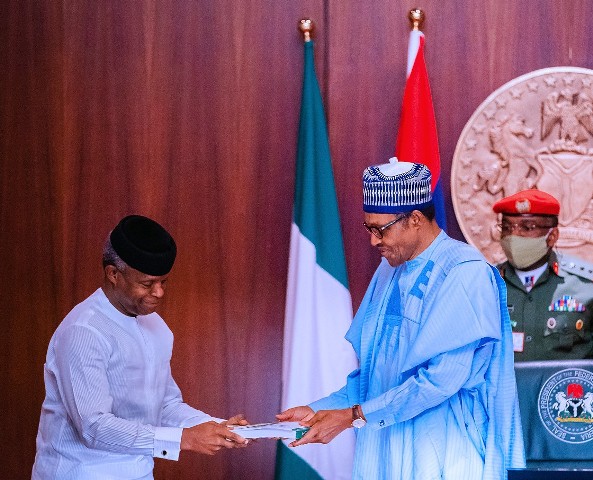

On June 11, President Muhammadu Buhari received the report of the Economic Sustainability Committee (ESC) headed by Vice President Yemi Osinbajo and described the report as a `National Plan.’

For the benefit of hindsight, Buhari had on March 30, constituted the Osinbajo-led ESC in a proactive move to guard and cushion Nigeria’s economy from the adverse economic impact of the pandemic.
Admittedly, the COVID-19 pandemic and its corollary economic relapse is plunging the global economy into recession in 2020.
More so, the International Monetary Fund (IMF), using the assessment of the National Bureau of Statistics (NBS) predicted that Nigeria’s economy would go into recession to a level of negative 3.4 per cent.
The terms of reference of the ESC included inter alia, to develop a clear Economic Sustainability Plan(ESP), identify fiscal and monetary measures to enhance oil and non-oil revenues in order to fund the plan; develop a stimulus package and come up with measures to create more jobs while keeping existing ones.
The ESC comprises the Minister of Finance, Budget and National Planning, Minister of State, Budget and National Planning, Minister of Industry, Trade and Investment and Minister of Labour and Employment.
Others are the Minister of State, Petroleum Resources, Governor of the Central Bank of Nigeria, Group Managing Director of NNPC and Permanent Secretary in the Cabinet Office – Secretary.
ESC later co-opted some ministers whose duties were apropos to the mandate of the committee.
Presenting the committee’s report, that is the ESP, to President Buhari on June 11, Osinbajo said the ESC consulted and received memoranda from the Presidential Economic Advisory Council, the 36 state governors and the leadership of the National Assembly.
He said it also took into account existing government policies and strategies, namely the Economic Recovery and Growth Plan (ERGP), Report of the Economic Crisis Committee (headed by the Minister of Finance, Budget and National Planning), the Finance Act 2019, Central Bank of Nigeria (CBN) proposals and the National Economic Council Report on the COVID-19 Crisis.
Osinbajo said that the ESC, in doing its work, was guided by the president’s directive to come up with a plan that would provide succour to Nigerians.
“Taking into account the dangers posed to the economy by the global economic slowdown, which also resulted in a drastic fall in crude oil production and prices, with serious implications for government revenues and foreign exchange earnings.
“ In addition, the inevitable mandatory lockdowns and social distancing measures put in place to curb the spread of COVID-19 have had a severe negative impact on farms and factories, as well as on trade, transport and tourism.’’
Osinbajo said that several projections, including those done by the NBS on behalf of the ESC, showed a severe downturn in the nation’s oil earnings, as a result of which, even with oil price at 30 dollars a barrel, Nigeria would still have a shortfall of about N185 billion every month, in the amount available for allocation to the three tiers of government.
He also said that the projections indicated that unemployment might rise to 33.6 per cent or about 39.4 million people by the end of 2020, if prompt preemptive measures were not taken.
According to him, the forecast shows that millions more will fall into extreme poverty, before the pandemic ends, while GDP may fall to between minus 4.40 per cent and minus 8.91 per cent, depending on the length of the lockdown period and strength of our economic response.
The vice president said that the committee decided on a strategy hinged on the president’s mantra to “produce what we eat and consume what we produce.”
He said that to create millions of new jobs, Nigeria needed to focus on encouraging local production, local services, local innovation, and emphasise the use of local materials.
“Nigeria and Nigerians can produce our food, build our houses and construct our roads, using local materials in all cases.
“If we must import, it must be to support local production. We have therefore recommended that we must carry out mass programmes that create jobs and utilise local materials.
“Such will include: A Mass Agricultural Programme, which is expected to bring between 20,000 and 100,000 hectares of new farmland under cultivation in every state of the federation and create millions of direct and indirect job opportunities.
“Extensive Public Works and Road Construction Programme focusing on both major and rural roads and using locally available materials like limestone, cement and granite.
“ Mass Housing Programme to deliver up to 300,000 homes annually, engaging young professionals and artisans who form themselves into small and medium scale businesses, within the construction industry, using indigenous labour and materials.
“Installation of Solar Home System, targetting five million households, serving about 25 million individual Nigerians who are currently not connected to the National Grid.’’
He said that the committee recommended support for local production and manufacturing of all that is possible, including tech apps, software, shoes, garments, steel fabrication, ceramics and furniture, with the required capital and essential machinery.
The committee also recommended the provision of ample support for the informal sector through low interest loans and by easing procedures for registration, licensing, obtaining permits, among others.
“ By these means, urban and informal business people like mechanics, tailors, artisans, and petty traders, will be encouraged to improve and develop their services.
“ Support for MSMEs, especially in assisting to restructure their loans with banks; among others, this will assist businesses in the pharmaceutical, aviation, hotels and the hospitality industry, private schools, road transportation, technology companies, and the creative industry, among others.
“Facilitation of broadband connectivity across the country and creation of a wide variety of technology and ICT jobs.
“ Expansion of the Social Investment Programme, through an increase in the number of cash transfer beneficiaries, N- Power volunteers and sundry traders enjoying small and micro loans through the MarketMoni and TraderMoni schemes.
“The preexisting conditional cash transfer will also be extended to cover a larger number of the extremely poor.’’
The vice president said that the key to the success of the plan was undoubtedly ‘implementation’—executing the plan faithfully and working in collaboration.
He said that the ESC recommended that each minister would be responsible for supervising the implementation of plans situated in their respective ministries.
According to him, ministers will also be responsible for ensuring synergy between all relevant stakeholders across the public and private sectors.
“The ESC, which is inter-ministerial in nature, should only then remain to oversee plan implementation, ensure inter ministerial co-ordination, and report regularly to the president, while expenditure is monitored through the National Monitoring and Evaluation Framework and the Budget Office of the Federation,’’ he said.
Buhari lauded ESC for a job well done and praised Nigerians for their resilience and adapting to the realities of COVID 19.
The president expressed delight that the committee had consultations with relevant stakeholders, adding that the administration was committed to implementing its recommendations.
“I am pleased to hear that the ESC consulted with both the National Economic Council and the National Assembly, and I look forward to a continuing partnership with both organs, to implement what I consider a national plan.
“As we go forward, we must chart a new course and remain steadfast; I believe the priorities contained in this plan present a practical way of achieving our desire of a truly competitive economy that can support our people and secure our future.
“I congratulate the ESC for completing this critical national assignment in good time.
“I believe that with God’s help and in a sense of duty to prosperity we will successfully reset our economy for a brighter future,” Buhari said.
Perceptive analysts are upbeat that if the report of the ESP is prudently implemented, Nigeria’s economy will not only survive the COVID-19 downturn, but will remain sustainably afloat.
Source:- NANFeatures
SPONSORED LINKS
[TRENDING SONG!!] Romani D-Fans – Bestie (Prod By Krizbeatz)
[TRENDING MIXTAPE!!] DJ Baddo – Bestie Unlimited Mix
[TRENDING SONG!!] TYSG Ft Bad Mz X Kendi Rozzi – Iyariya
INSTALL 9JAFLAVER MUSIC APP, STREAM, DOWNLOAD, AND PLAY MUSIC OFFLINE
CHECK OUT FUNNY PICTURE AND MEME HERE (CLICK HERE)
Chissom Anthony – Glory To God In The Highest [See Trending Gospel Song]
© 2014-2023 9jaflaver. All Rights Reserved.
About us | DMCA | Privacy Policy | Contact us
| Advertise| Request For Music | Terms Of Service
9jaflaver is not responsible for the content of external sites.